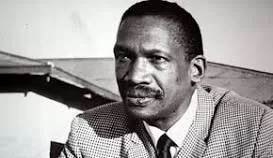Robert Mangaliso was born to Hubert and Angelina Sobukwe on 5th December 1924. His parents were of peasantry class in a humble background, his father worked as a municipal cleaner and his mother was a cook at a local hospital in Cape province.
Like many pan Africanists Sobukwe picked an interest in African literature at a young age, he graduated as a teacher and was not given any teaching post because of his African background. Frustrated Sobukwe then enrolled in a financial assistance course at the Heal Town Institute, his schooling was briefly interrupted in 1943 when he was admitted to a hospital suffering from tuberculosis.
He later received a scholarship at Fort Hale University, it was at Fort Hale that he became interested in fighting apartheid policy in South Africa. Though Fort Hare operated in an environment of racial segregation even before apartheid, the college contained the seeds of a more tolerant South Africa, it was as racially inclusive as it could be at the time, with black, colored, and Indian students studying as one.
Fort Hare was an institution where generations of young black South Africans and black students from other African nations were exposed to politics. Such an environment combined to make Sobukwe more politically active, it was at Fort Hare that he joined the African National Congress.
In 1954 Sobukwe moved to Johannesburg and established himself as a junior lecturer in African studies at Witwatersrand University, he then settled in Soweto and became an editor of The Pan Africanist magazine. He used this magazine as an increasingly critical platform against the ANC domination by liberal left multiracialism.
In 1958 Sobukwe became so much involved in the struggle for common rights in South Africa he advocated that the future of South Africa should be in total control of all black South Africans. As a result of this skepticism towards the multi-racial path the ANC was following, he was instrumental in forming an African breakaway from, the ANC which led to the birth of the Pan Africanist Congress.
The newly formed PAC called for protests against the pass laws, the pass law was a document all Africans had to carry to allow them to move to cities where many whites lived. At this point, the apartheid authorities viewed Sobukwe as more dangerous than Nelson Mandela. Sobukwe allied with the African National Congress to oppose the racist apartheid regime in 1960.
This made him a direct target of the racist regime in South Africa. As an Africanist, he was a strong advocate for the political unity of the African continent particularly in the context of the Cold War era. Sobukwe was arrested, and sent to solitary confinement. In 1960 Sobukwe was arrested for incitement of blacks to urge the repeal of pass laws after leading a peaceful black march to Orlando police station in 1960.
On the same day similar protests happened in Sharpeville, hundreds of black people handed in their pass cards to police thereby deliberately courting arrest. Sobukwe was sentenced but he refused to appeal against his sentence, he refused the aid of an attorney on grounds that the court had no jurisdiction over him he insisted the court was not either a court of law or a court of justice, he later spent the rest of his life in prison in house arrest.
In 1977 Sobukwe fell ill and applied for permission to receive further medical treatment in Johannesburg, his request was denied initially, but later granted with strict restrictions of reporting police station every time he left his home, he later died from lung complications on 27th February 1978.
Kamukama Rukundo Clinton is a Ugandan pan-Africanist, author, and columnist for 1cananews who can be contacted via +256704393540 or rukundopeter33@gmail.com















































